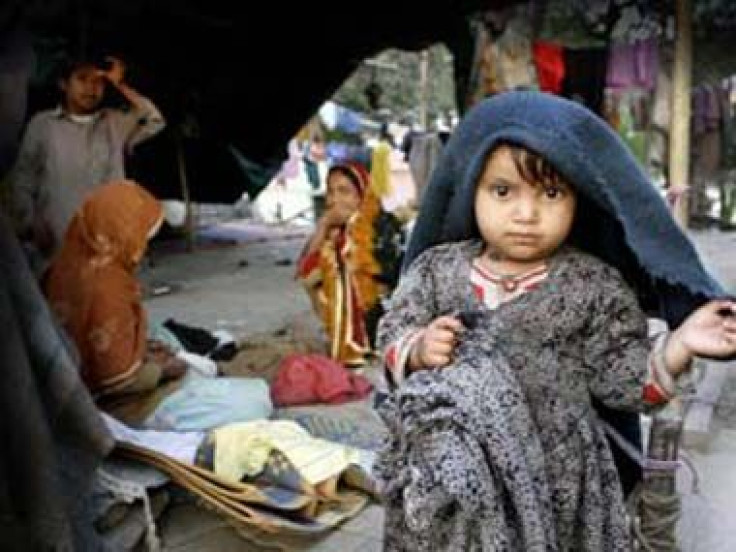Pakistan's Hindus Outraged Over Forced Conversions Of Young Girls To Islam

Hindus in Muslim-dominated Pakistan have expressed their anger and indignation over another round of what they have characterized as “forced conversions.” The Press Trust of India news agency reported that Hindu girls as young as six are being pressured to convert to Islam, usually through arranged marriages with Muslim men.
"Can you accept your daughters being forcibly married to Hindu men?" complained a Pakistani Hindu named Raj Kumar, whose niece Rinkle Kumari was allegedly forced to convert to Islam by marrying a Muslim man in 2012. Rinkle’s saga received massive media attention and even came to the attention of the nation’s Supreme Court. At a seminar at the Karachi Press Club on Sunday, Raj Kumar introduced the audience to Jumna, a 6-year old Hindu girl from the city of Mirpurkhas in Sindh province, whose forced conversion to Islam was prevented after local media took up their cause. She also has a 10-year-old sister named Pooja. "What do children as young as Jumna and Pooja know about Islam and their own religion, for that matter, that they'd want to convert? This is the height of injustice," Kumar said, according to Dawn, an English-language Pakistani daily.
Jumna and Pooja's mother, Marju, and father, Soma, also attended the Karachi event. "We are poor people. My little girls helped supplement our income by selling clay toys and utensils door to door. On Feb. 4, they left home as usual with their basket of toys but didn't return. We raised an alarm," Soma said. "After several reports in the media about our missing girls, it was found that they had been staying with a man named Rajab Pathan. The police of our area later produced them in court as Muslim children. We were prevented by the police from seeing them too."
Soma then explained that the courts sent his daughters to a women’s home on suspicions they had been abused at home. "Little Jumna has been given back to us now but Pooja is still at the Darul Aman [the women’s shelter]. She seems to have been brainwashed into saying strange things about us. Her mind seems affected by the trauma," he added.
It is believed the girls were kidnapped with the intention of forcibly converting them to Islam.
Kishan Chand Parwani, chairman of the All Hindu Rights Organisation, commented that the problems faced by Pakistan's minorities are "multiplying instead of decreasing." According to Dawn, Parwani lamented that during his five terms in Parliament, the rights of Pakistan’s Hindu minority was never given top priority and that Hindu girls are still subject to forced marriages to Muslims. "Minorities are protected by law everywhere in the world, but the Hindu community in Pakistan is facing harassment at every level," Parwani said.
Indeed, for Pakistan’s Hindu minority, who number some 6 to 7 million people (out of a total population of some 190 million), the larger issue is the threats posed to its very existence by the resurgence of Muslim extremists. The current Hindu community represent the remnants of people who did not flee to India during the violent Partition of 1947. In a joint statement, the International Federation for Human Rights and the Human Rights Commission of Pakistan demanded urgent measures to end violence, discrimination and marginalization faced by the citizens of Pakistan on account of their religious beliefs.
On the other hand, an Indian journalist named Jyoti Punwani, visiting Pakistan, wrote in The Hindu newspaper that Muslims and Hindus in Pakistan have much in common and usually overcome their religious differences and get along quite well. “Nine days of meeting [friendly, helpful] people… in Pakistan left me wondering about the kind of transformation in Indo-Pak relations if only people were allowed to meet freely,” she wrote. “Having covered Hindu-Muslim violence in India for years, where the only identity that mattered was religion, it came as a revelation … that language binds Pakistanis more than religion.” (The majority of Hindus in Pakistan live in Sindh province in the south).
Punwani noted that Pakistani Sindhis treated her as one of their own, only from across the border. “What mattered was neither my nationality nor my faith; just that I was a Sindhi,” she said. One elderly Hindu woman in Pakistan even told her: “My birth, my marriage, my children’s births, our lives and deaths, everything is here. Pakistan is our home.”
© Copyright IBTimes 2024. All rights reserved.











